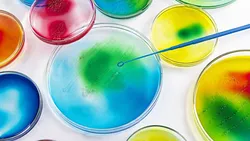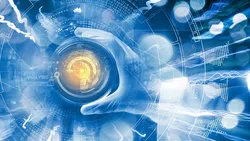
Microbiology Diagnostic Tests 
This course covers a range of microbiology diagnostic tests, including the Disk Diffusion Test, Coagulase Test, Catalase Test, Oxidase Test, DNAse Test, Citrate Test, Lecithinase Test, Indole Test, Hippurate Hydrolysis Test, Lipase Test, Acidic and Basic Stains, Gram Stain, Acid-Fast Stain, Endospore Stain, Capsule Stain, Flagella Stain, Snyder Test Agar, Cytopathic Effects, Mannitol Salt Agar, Eosin Methylene Blue Agar, MacConkey Agar, Eijkman Test, Bile Esculin Agar, XLD Agar, Quadrant Streak, and Axenic Culture. ▼
ADVERTISEMENT
Course Feature
![]() Cost:
Cost:
Free
![]() Provider:
Provider:
Youtube
![]() Certificate:
Certificate:
Paid Certification
![]() Language:
Language:
English
![]() Start Date:
Start Date:
On-Demand
Course Overview
❗The content presented here is sourced directly from Youtube platform. For comprehensive course details, including enrollment information, simply click on the 'Go to class' link on our website.
Updated in [February 21st, 2023]
Disk Diffusion Test (Kirby-Bauer Test).
Coagulase Test.
Catalase Test.
Oxidase Test.
DNAse Test (DNA Hydrolysis Test).
Citrate Test.
Lecithinase Test.
Indole Test.
Hippurate Hydrolysis Test.
Lipase Test with Spirit Blue Agar.
Acidic vs. Basic Stains in Microbiology.
Gram Stain Procedure.
Acid-Fast Stain.
Endospore Stain Procedure (Moeller and Schaeffer-Fulton Methods).
Capsule Stain.
Flagella Stain.
Snyder Test Agar.
Cytopathic Effects.
Mannitol Salt Agar (MSA).
Eosin Methylene Blue Agar (EMB Agar).
MacConkey Agar.
Eijkman Test.
Bile Esculin Agar (BEA Test).
XLD Agar (Xylose Lysine Deoxycholate Agar).
Quadrant Streak (Streak Plate Method).
Axenic Culture in Microbiology.
(Please note that we obtained the following content based on information that users may want to know, such as skills, applicable scenarios, future development, etc., combined with AI tools, and have been manually reviewed)
1. You can learn the principles and procedures of various microbiology diagnostic tests, such as Disk Diffusion Test (Kirby-Bauer Test), Coagulase Test, Catalase Test, Oxidase Test, DNAse Test (DNA Hydrolysis Test), Citrate Test, Lecithinase Test, Indole Test, Hippurate Hydrolysis Test, Lipase Test with Spirit Blue Agar, Acidic vs. Basic Stains in Microbiology, Gram Stain Procedure, Acid-Fast Stain, Endospore Stain Procedure (Moeller and Schaeffer-Fulton Methods), Capsule Stain, Flagella Stain, Snyder Test Agar, Cytopathic Effects, Mannitol Salt Agar (MSA), Eosin Methylene Blue Agar (EMB Agar), MacConkey Agar, Eijkman Test, Bile Esculin Agar (BEA Test), XLD Agar (Xylose Lysine Deoxycholate Agar), Quadrant Streak (Streak Plate Method), and Axenic Culture in Microbiology.
2. You can understand the importance of microbiology diagnostic tests in the medical field, and how to use them to identify and diagnose diseases. You can also learn the principles of different stains and agar plates, and how to interpret the results of the tests.
3. You can gain knowledge of the different types of bacteria and their characteristics, and how to differentiate between them. You can also learn how to use the tests to identify the presence of bacteria in a sample, and how to interpret the results.
4. You can learn how to use the tests to detect the presence of specific bacteria in a sample, and how to interpret the results. You can also learn how to use the tests to identify the presence of specific bacteria in a sample, and how to interpret the results.
5. You can gain an understanding of the different types of bacteria and their characteristics, and how to differentiate between them. You can also learn how to use the tests to identify the presence of bacteria in a sample, and how to interpret the results.
[Applications]
After completing this course, students should be able to apply the knowledge they have gained to diagnose and identify microorganisms. They should be able to use the various tests such as the Disk Diffusion Test (Kirby-Bauer Test), Coagulase Test, Catalase Test, Oxidase Test, DNAse Test (DNA Hydrolysis Test), Citrate Test, Lecithinase Test, Indole Test, Hippurate Hydrolysis Test, Lipase Test with Spirit Blue Agar, Acidic vs. Basic Stains in Microbiology, Gram Stain Procedure, Acid-Fast Stain, Endospore Stain Procedure (Moeller and Schaeffer-Fulton Methods), Capsule Stain, Flagella Stain, Snyder Test Agar, Cytopathic Effects, Mannitol Salt Agar (MSA), Eosin Methylene Blue Agar (EMB Agar), MacConkey Agar, Eijkman Test, Bile Esculin Agar (BEA Test), XLD Agar (Xylose Lysine Deoxycholate Agar), Quadrant Streak (Streak Plate Method), and Axenic Culture in Microbiology to identify and diagnose microorganisms.
[Career Paths]
1. Microbiologist: Microbiologists study microorganisms such as bacteria, viruses, algae, fungi, and some types of parasites. They use a variety of techniques, such as the Kirby-Bauer Test, Coagulase Test, Catalase Test, Oxidase Test, DNAse Test, Citrate Test, Lecithinase Test, Indole Test, Hippurate Hydrolysis Test, Lipase Test with Spirit Blue Agar, Acidic vs. Basic Stains in Microbiology, Gram Stain Procedure, Acid-Fast Stain, Endospore Stain Procedure (Moeller and Schaeffer-Fulton Methods), Capsule Stain, Flagella Stain, Snyder Test Agar, Cytopathic Effects, Mannitol Salt Agar (MSA), Eosin Methylene Blue Agar (EMB Agar), MacConkey Agar, Eijkman Test, Bile Esculin Agar (BEA Test), XLD Agar (Xylose Lysine Deoxycholate Agar), Quadrant Streak (Streak Plate Method), and Axenic Culture in Microbiology, to identify and classify microorganisms. The demand for microbiologists is increasing due to the growing need for medical and environmental research.
2. Clinical Laboratory Technologist: Clinical laboratory technologists use the same techniques as microbiologists to identify and classify microorganisms. They also perform tests to diagnose diseases, monitor treatments, and detect the presence of infectious agents. The demand for clinical laboratory technologists is increasing due to the growing need for medical research and the development of new diagnostic tests.
3. Medical Laboratory Scientist: Medical laboratory scientists use the same techniques as microbiologists and clinical laboratory technologists to identify and classify microorganisms. They also perform tests to diagnose diseases, monitor treatments, and detect the presence of infectious agents. The demand for medical laboratory scientists is increasing due to the growing need for medical research and the development of new diagnostic tests.
4. Research Scientist: Research scientists use the same techniques as microbiologists, clinical laboratory technologists, and medical laboratory scientists to identify and classify microorganisms. They also conduct research to develop new diagnostic tests and treatments for diseases. The demand for research scientists is increasing due to the growing need for medical research and the development of new diagnostic tests and treatments.
Course Provider

Provider Youtube's Stats at AZClass
Discussion and Reviews
0.0 (Based on 0 reviews)
Explore Similar Online Courses

Tell Your Brand Story & A Brand First Workshop

Face detection with OpenCV in Python OpenCV Python Tutorial for Beginners in 2021 Great Learning

Python for Informatics: Exploring Information

Social Network Analysis

Introduction to Systematic Review and Meta-Analysis

The Analytics Edge

DCO042 - Python For Informatics

Causal Diagrams: Draw Your Assumptions Before Your Conclusions

Whole genome sequencing of bacterial genomes - tools and applications

Microbiology and Forensic Science

Microbiology Textbook


Start your review of Microbiology Diagnostic Tests